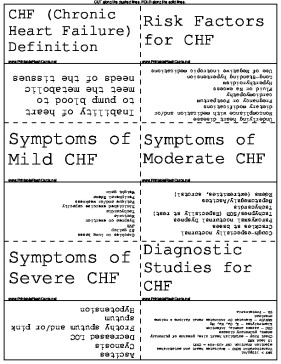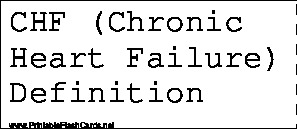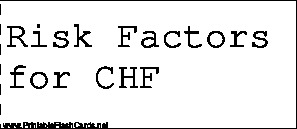

Great for medical students, these printable flash cards cover chronic heart failure.
There are 15 flash cards in this set (3 pages to print.)
To use:
1. Print out the cards.
2. Cut along the dashed lines.
3. Fold along the solid lines.
Sample flash cards in this set:




| Questions | Answers |
|---|---|
| CHF (Chronic Heart Failure) Definition | Inability of heart to pump blood to meet the metabolic needs of the tissues |
| Risk Factors for CHF | Underlying heart disease Noncompliance with medication and/or dietary modifications Pregnancy or Postpartum cardiomyopathy Fluid or Na excess Hyperthyroidism Long-Standing hypertension Use of Negative inotropic medications |
| Symptoms of Mild CHF | Crackles in lung bases S3 gallop JVD Dyspnea on exertion Nocturia Tachycardia Diminished exercise capacity Fatigue and/or weakness Peripheral Edema Weight gain |
| Symptoms of Moderate CHF | Cough-especially nocturnal Crackles at bases Paroxysmal nocturnal Dyspnea Tachypnea/SOB (Especially at rest) Tachycardia Hepatomegaly/Ascites Edema (extremities, scrotal) |
| Symptoms of Severe CHF | Ascites Cyanosis Decreased LOC Frothy sputum and/or pink sputum Hypotension |
| Diagnostic Studies for CHF | BNP > 100pg/ml Transthoracic ECHO - Evaluates heart and establishes ejection fraction (EF <35-40% = CHF) 12 lead EKG Chest Xray - establish heart size, presnce of pulmonary edema, pulmonary disease CBC - assess anemia, infection Electrolytes - K, Ca, Na, Mg BUN/Cr - Elevated Cr indicates renal failure & volume overload UA - Proteinuria |
| NY Heart Assoc Functional Classification of CHF | Class I: Physical activity does not cause limitation Class II: Physical activity brings about "slight limitation" (fatigue, palpitations, dyspnea, anginal pain) Class III: Less than normal physical activity brings about "marked limitations" Class IV: Unable to participate in any physical activity without discomfort; symptoms at rest |
| Nonpharmacologic Management of CHF | Surgery for underlying valve problems or correctable etiologies Avoid smoking, alcohol Na restriction Fluid restriction if approp. Daily weights for early ID of fluid overload Pt education Encourage exercise unless severe CHF |
| Pharmacologic Management of CHF | ACE Inhibitors Loop Diuretics Beta Blockers Digoxin |
| ACE Inhibitors in CHF | Decrease pulmonary systemic vascular resistance, decrease preload and afterload, increase cardiac output and exercise tolerance Commonly used pot MI for systolic dysfunction or in pts with clinical symptoms of CHF (SOB, fatigue, exercise intolerance) Monitor K levels and renal function within 1-2 weeks of initiation and after dose change Start low and titrate every 2-4 wks Preferred in pts with Diabetes and CHF |
| Loop Diuretics in CHF | Inhibit absorption of Na and Cl in the loop of Henle & can produce profound diuresis Monitor for hyponatremia, hypokalemia, hypomagnesemia, dehydration & hypotension Use in pts with evidence of moderate to severe fluid retention l |
| Beta Blockers in CHF | Decreases sympathetic stimulation by beta blockade in the heart Used in conjunction with ACEI, diuretics with/without digoxin Do NOT prescribe in unstable pt or pts with fluid overload Cautious use or avoid in respiratory pts. Titrate dose to improve clinical symptoms |
| Digoxin in CHF | Increases intracellular concentration of Ca which increases force of myocardial contraction Decreases activation of the sympathetic nervous system Monitor for toxicity, anorexia, nausea, muscle weakness Use in pts with CHF secondary to poor myocardial contractility Consider in pts with A fib with RVR Do NOT use with heart block Cautious with agents that decrease HR (BBs). Use in conjunc with ACEi, diuretic, BB |
| Special Pharmacological Considerations for CHF | Most pts are managed on 3-4 meds Symptom relief may take several weeks Diuretics provide quickest relief from CHF symptoms but should be use with other meds Monitor K levels on pts taking diuretics and ACEI Monitor renal function and K 1-2 weeks after start and with dose change Initiate BB at very low dose in stable pt without evidence of fluid overload Do NOT start BB or ACEI if SBP <80 |
| Follow up for CHF | Variable depending on pt circumstances, but generally daily, until exacerbation resolves, then 1-2 wks until pt is symptom free, then every 3-6 months |